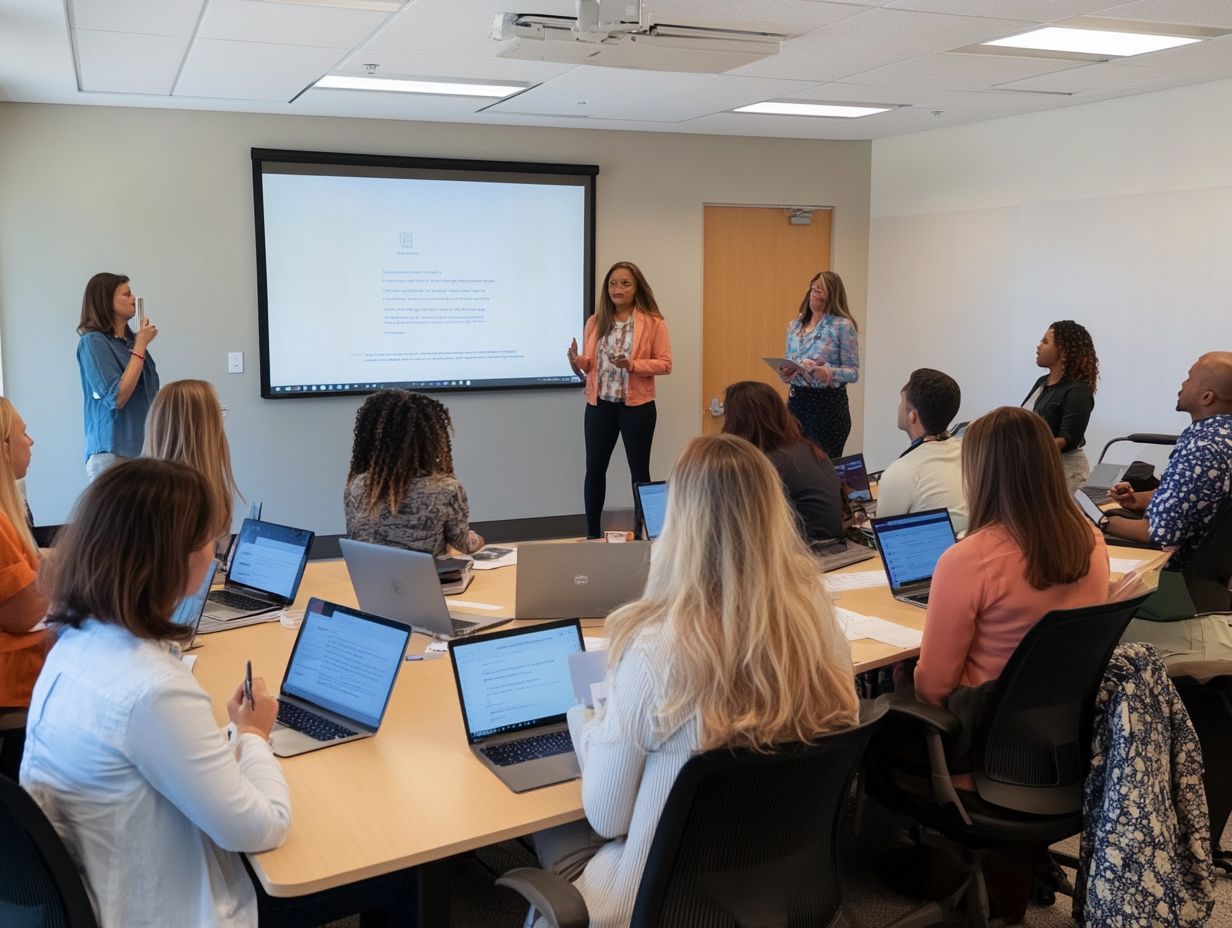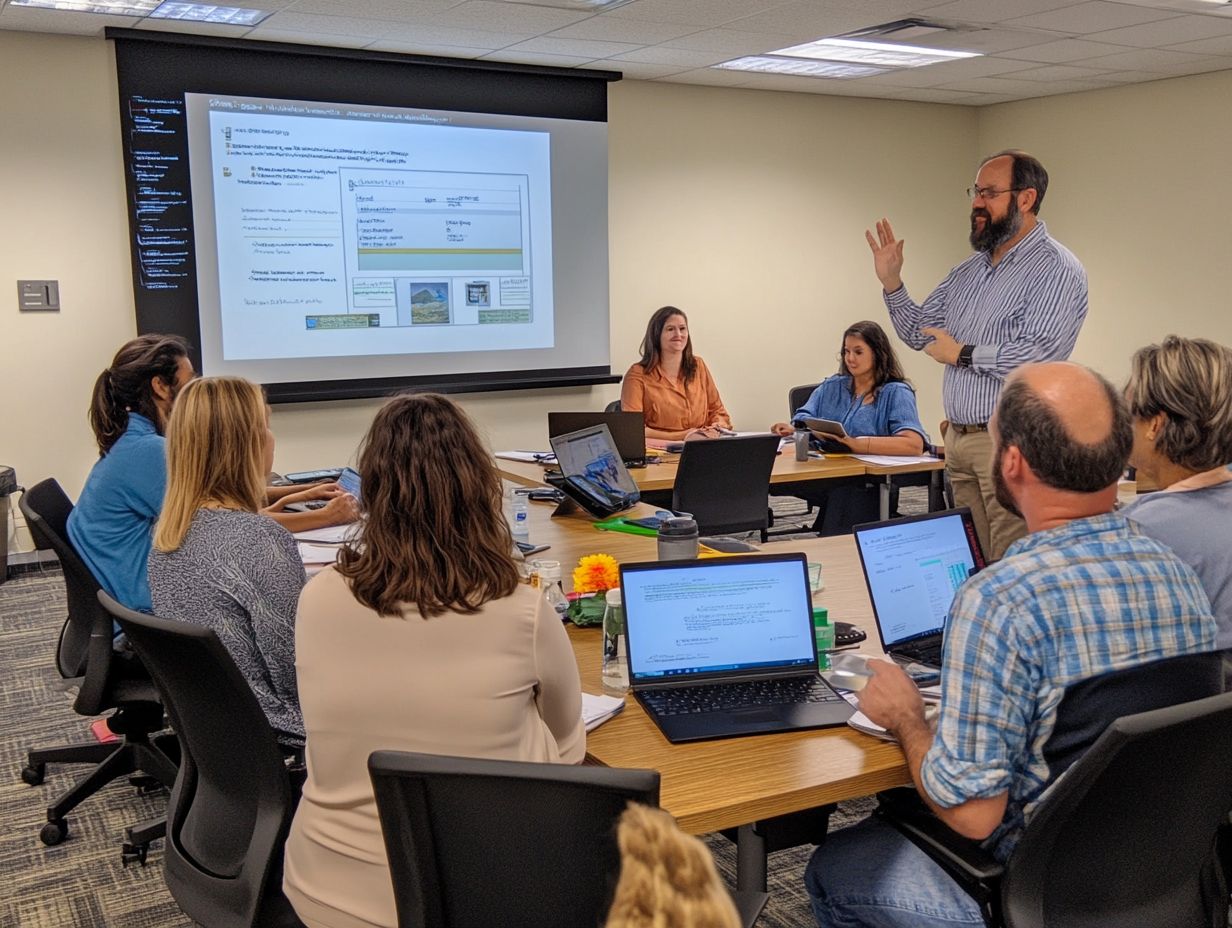The Role of Skill Enhancement in Employee Retention
In today s competitive business landscape, retaining talent has become more crucial than ever. High employee turnover can drain your resources, disrupt team dynamics, and hinder overall productivity.
This article delves into the vital connection between employee retention and skill enhancement. You ll discover various programs that can empower your employees, from training initiatives to mentoring opportunities, along with best practices for seamless implementation.
Through real-life case studies that highlight successful strategies, you ll see how investing in your team s skills not only strengthens morale but also keeps them engaged and committed. Let s explore how enhancing skills can truly transform your workplace and foster long-term employee loyalty.
Contents
- Key Takeaways:
- The Importance of Employee Retention
- The Impact of Skill Enhancement on Employee Retention
- Types of Skill Enhancement Programs
- Implementing Skill Enhancement in the Workplace
- Measuring the Effectiveness of Skill Enhancement
- Case Studies of Successful Skill Enhancement Programs
- Frequently Asked Questions
- What is the role of skill enhancement in employee retention?
- How does skill enhancement contribute to employee retention?
- What are some ways to enhance employee skills?
- Why is it important to focus on skill enhancement for employee retention?
- What are the potential consequences of not investing in skill enhancement for employee retention?
- How can employers measure the success of their skill enhancement initiatives for employee retention?
Key Takeaways:

- Retaining employees is essential for business success because it saves costs and boosts productivity.
- Skill enhancement leads to higher job satisfaction and better performance.
- Different types of skill enhancement programs, such as training, mentoring, and coaching, can be implemented in the workplace.
The Importance of Employee Retention
Employee retention stands as a cornerstone of organizational success. High turnover rates can significantly hinder your talent acquisition efforts, diminish employee satisfaction, and inflate training costs.
Research from PwC and Deloitte reveals that when you prioritize employee retention, you not only strengthen organizational growth but also cultivate a culture of continuous learning that effectively addresses skill gaps within your workforce.
Why Retaining Employees is Crucial for Business Success
Retaining employees is essential for your business’s success, as it directly impacts job satisfaction. This boost in satisfaction enhances overall productivity and fortifies your competitive edge in the market.
Several factors play a vital role in achieving effective employee retention, including your organizational culture and the opportunities you provide for professional growth. A positive work environment cultivates loyalty and enhances employee satisfaction.
Implementing upskilling programs empowers your employees and elevates engagement levels, resulting in lower turnover rates. Research published in the Harvard Business Review shows that retaining skilled employees significantly reduces recruitment costs and accelerates project timelines, ultimately aligning with your strategic objectives.
Investing in workforce development not only enhances job satisfaction but also ensures you maintain a motivated and skilled workforce capable of adapting to industry changes.
The Impact of Skill Enhancement on Employee Retention
Skill enhancement is crucial for employee retention. Upskilling programs not only address skill gaps but also encourage internal mobility, allowing employees to move into different roles within the company. This gives them the power to take control of their career advancement through learning at their own pace.
By investing in your growth, you re not just enhancing your abilities; you re also positioning yourself for a future filled with opportunities.
How Improving Skills Can Help Retain Employees
Improving your skills through targeted training opportunities can significantly enhance employee retention by fostering a strong sense of loyalty and commitment to the organization. When you feel that your growth is prioritized, you’re much more likely to stay engaged and motivated.
Consider personalized training programs designed to align with your individual strengths and career aspirations. These can empower you, making you feel valued and essential to the company s success. Likewise, innovation leadership programs are instrumental in cultivating future leaders, equipping you with the critical skills needed to navigate challenges effectively.
Take, for example, a tech company that implemented a mentorship program, pairing seasoned leaders with emerging talent. This initiative not only bolstered the skills of the up-and-coming professionals but also instilled a deep sense of belonging. Strategic investments in development like these create an environment where you are motivated to stay and play a vital role in propelling the organization forward.
Types of Skill Enhancement Programs

Discover a variety of exciting skill enhancement programs tailored for you! These options range from traditional training and mentoring opportunities to cutting-edge digital upskilling platforms offered by esteemed leaders like Microsoft and Duolingo.
Training, Mentoring, and Other Options
Training and mentoring are important parts of skill enhancement, presenting you with structured opportunities for growth and development that resonate with your personal ambitions and organizational objectives.
By cultivating an environment of continuous learning, these programs give you the power to take charge of your career journey. For instance, organizations like MDA Training develop tailored mentorship initiatives that connect you with seasoned professionals, offering invaluable guidance to help you master specific skills while understanding workplace relationships.
These mentor-mentee relationships foster a robust support network, encouraging knowledge sharing and cultivating your confidence. Workshops and hands-on training sessions play vital roles as well, allowing you to dive into practical applications of your learning. This approach ultimately drives increased productivity and sparks innovation within the workforce.
Implementing Skill Enhancement in the Workplace
Implementing skill enhancement in the workplace requires you to adopt best practices and strategies that not only prioritize workforce development but also focus on enhancing employee satisfaction and engagement.
By embracing this approach, you create an environment NOW where your growth and the organization’s success can flourish!
Best Practices and Strategies
Implementing best practices for skill enhancement involves strategies that not only address skill gaps but also promote continuous learning and elevate employee satisfaction throughout the organization.
By investing in tailored training programs, you create an environment where employees feel valued and empowered to grow. According to SHRM, fostering opportunities for professional development not only closes skill gaps but also cultivates a sense of belonging within the workforce.
When employees are engaged in their roles and have access to learning resources, their motivation soars.
The Washington Post emphasizes that companies with robust training initiatives experience significant improvements in employee retention rates (the rate at which employees leave a company). Ultimately, nurturing a culture of continuous learning ensures that your organization remains agile, adapting to market changes while enhancing overall job satisfaction.
Measuring the Effectiveness of Skill Enhancement
Measuring the effectiveness of skill enhancement initiatives is vital for assessing their impact on employee retention, especially among Gen-Z and millennials, who place a high value on growth and development in their careers.
By evaluating these initiatives, you can better understand how they resonate with your workforce and foster a culture of continuous improvement that aligns with their aspirations.
Evaluating the Impact on Employee Retention

Evaluating the impact of skill enhancement on employee retention requires you to analyze a variety of performance metrics that reflect employee satisfaction and engagement levels.
Organizations often consider factors like turnover rates, employee feedback, and productivity improvements as essential indicators of retention influenced by skill development programs. Metrics such as training completion rates and subsequent performance reviews can offer valuable insights into how these enhancement initiatives contribute to overall job satisfaction.
Companies like Google and AT&T have paved the way by implementing ongoing training sessions, regularly assessing outcomes through employee surveys and performance tracking systems. By cultivating a culture of continuous learning and development, these organizations not only retain top talent but also elevate overall workplace morale and productivity.
Investing in skill enhancement not only boosts employee morale but also transforms your organization into a thriving hub of innovation and productivity.
Case Studies of Successful Skill Enhancement Programs
Case studies of successful skill enhancement programs provide amazing insights that can transform organizations. For instance, Yahoo has adeptly boosted employee retention through innovative initiatives and targeted employee development. These examples illustrate the profound impact that a thoughtful approach to skill enhancement can have on fostering a committed and engaged workforce.
Real-Life Examples of Companies Retaining Employees Through Skill Enhancement
Real-life examples of companies successfully retaining employees through skill enhancement emphasize the critical importance of investing in employee development. By fostering a culture of innovation and forward-thinking management, organizations can truly flourish.
Take Google, for instance. It has long been celebrated for its comprehensive training programs. Particularly, the ‘CareerGuru’ initiative connects employees with mentors within the organization. This program not only encourages personal growth but also cultivates a strong sense of community among employees, leading to elevated job satisfaction.
AT&T has embraced an ongoing learning strategy called ‘AT&T University’. This initiative offers employees the opportunity to develop their skills in technology and management. These initiatives have proven remarkably effective in significantly reducing turnover rates and boosting morale. It s clear that companies can thrive when they prioritize their employees professional growth.
Frequently Asked Questions
Curious about how skill enhancement boosts employee retention? Here are some answers to your pressing questions!
What is the role of skill enhancement in employee retention?
Skill enhancement plays a vital role in keeping employees engaged and satisfied. It facilitates the growth and development of employees by providing them with new skills and knowledge.
How does skill enhancement contribute to employee retention?

Skill enhancement contributes to employee retention by creating a learning culture within the organization. By using e-learning for employee retention strategies, employers can show that they are invested in their employees’ growth and career progression, making them more likely to stay long-term.
What are some ways to enhance employee skills?
There are various ways to enhance employee skills. These include providing training programs, offering opportunities for job shadowing where employees observe colleagues to learn about their roles and encouraging attendance at conferences and workshops.
Why is it important to focus on skill enhancement for employee retention?
Focusing on skill enhancement for employee retention is crucial. It not only helps to retain existing employees but also attracts top talent to the organization.
What are the potential consequences of not investing in skill enhancement for employee retention?
If a company does not invest in skill enhancement, it may face high turnover rates. Employees may feel stagnant and unchallenged, negatively impacting company culture and productivity.
How can employers measure the success of their skill enhancement initiatives for employee retention?
Employers can measure the success of skill enhancement initiatives by tracking employee engagement and satisfaction levels. Retention rates and employee feedback, along with performance evaluations, can help assess improvements in skills and job performance.






